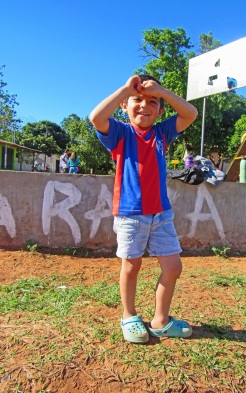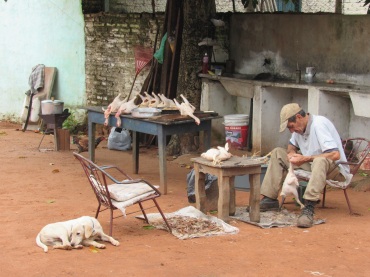Forgive me for the length of this post, but it’s been awhile since I’ve had access to wifi on my computer and in that time frame, so much has happened. As such, I’ve split this post into two: the first portion revolving around first arriving in Paraguay and the second about the time spent with my host family and other volunteers so far. Aguyve!
Guarambaré, Paraguay
We were standing as a group next to the park in the late afternoon. Hannah had brought a Frisbee, which attracted a whole slew of children, and two of her host siblings had tagged along with her. I was never told her sister’s name, but very quickly I learned that the little one chasing dogs with a big stick was Leo. “El Terror”. Later on, as the game of Frisbee toss turned into less of a casual, organized game and more into a free-for-all of chaotic six year olds, I felt a tap on my thigh. Leo had seen my camera. “Saca mi foto por favor” he said with a bashful bat of eyelashes. I laughed, “Por supuesto.” I found the right light, knelt down, and said, “Sonreir.” “Sonríe,” he corrected and covered his head with his hands in a gesture of frustration at my lack of prowess at verb conjugation. The shutter snapped. “¿Cómo te llamas?” I asked. “Leo.” “Mucho gusto.” He smiled and ran away. El Terror.
Arriving in Asunción was surreal. After a red-eye flight that landed at 8 AM, somehow all 50 of us made it through customs and found our bags with the help of Peace Corps staff. We were so delirious, I don’t know what would’ve happened without them. All of a sudden, pictures were being taken and our bags magically found themselves on the buses. Then, Eric, Jess, and I were sitting in the back row of a squished Peace Corps van and watching Paraguay pass by in the window. How did that happen? Paraguay?
From Asunción, we drove to the Peace Corps training center in Guarambaré, just outside of the capitol. The day is a blur, but I will never forget walking into that building and being greeted by every member of our training staff, who were singing beautifully in Guaraní, accompanied by Juan on the guitar, smiles on every face. That image alone and the sound of that song will forever remain in my memory; signing papers, receiving my schedule, and getting my med kit, amongst other tasks, will not.
After some downtime, which mainly involved a large group of us dissecting my med kit and making jokes about the lack of condoms, yet large quantities of anti-diarrheal medicine, we were informed that our host families were waiting to meet us in satellite communities nearby. Some of us went into a nervous state of shock, realizing that we were about to be set loose with a family that probably spoke little to no English, and somehow, we were supposed to talk to them. Awkward silence is to be expected, along with a healthy dose of “¿Qué?”. I am not confident when it comes to speaking Spanish. I can read and write relatively well, but when you set me in front of a family of native speakers, every little piece of vocabulary or conjugation that I have learned over the last ten years vanishes completely. Then, added on top, I was expected to learn Guaraní, Paraguay’s other official language, and be able to speak that with them after a few weeks as well. What did I get myself into?
Whatever I did get myself into, it’s incredible. Along with 11 other environmental conservation trainees, I was placed in the community of Nueva Esperanza, where we would live with our families and take our language classes for both Spanish and Guaraní. I was placed with an amazing family (let’s be honest for a moment: I definitely received placement with the best family) that consists of Juan, el papá, Maria Estela, la mamá, Alejandro (Ale), their son, and Vovi, the dog (whose actual name is Bobby, but for the longest time it sounded like Vovi and I think it sounds cooler). Other family members have gradually introduced themselves as they stop by in the evening, particularly Carlo, Juan’s brother, who stops by every evening. And afternoon. And morning. They have been extraordinarily helpful, particularly Ale, who likes to accompany us when all of the trainees in Nueva Esperanza get together and go for walks. He’s patient and funny and has become my full-on little brother.
Carlo has also been extremely helpful. He understands that this group of trainees loves the Earth and is going to dedicate a lot of our time to it. His heart lies in planting and taking care of peoples gardens and plots for them and he took me on a trip to his own house so that I may see his gardens. They were stunning; a perfect picture of Paraguay with every vegetable imaginable planted in neat rows underneath trees bearing every sort of fruit and flower. He told me the name of every plant in both Spanish and Guaraní and then gave me several seeds for my own future garden. He and I can sit on the front porch of my house for hours, not saying much, but just passing tereré (a cultural tradition that I’ll go into later).
My new home is simple, but I don’t care. I love it here already and I am surrounded by people, whether they are my new host family, my professors, or my fellow trainees, who are so caring and understanding, that they are all that’s needed. I know that this post was not descriptive, but I could write a novel about this weekend. I could tell you about my lessons that I’ve already had, my trip on the bus to the most chaotic supermarket I’ve ever seen, or the long walk that we took as a group with Ale as he showed us guayaba and climbed a tree to pick the ripest ones to eat. I could write about these amazing experiences, but I will save them for another day. I have twenty seven months to share and for now, I just want to say that I am here, I am family, I am happy. Tranquilopa.
Nueva Esperanza, Paraguay
Ale laughed. He always laughs at my Guaraní, though I’ll be the first to admit that it’s pretty atrocious. “Una vez más,” he asked, wanting to put on a show in front of all of these new people I had just met. Thanks Ale. Gracias por mucho. Earlier that day, those 8 of us in Nueva Esperanza that had begun learning Guaraní had covered our bases with food-related words. Our favorite is the word for “fried egg”, which I had promptly and proudly told Ale when I got home from school. He thought it was hilarious. “Una vez más.” “Si si si. Ryguasu rupi’a chyryry.” They burst out laughing. All of these new acquaintances. Then someone told me that I messed up one syllable. What did I say instead? “Fried testicle.” Thanks Ale. Gracias por mucho.
First of all, imagine being in a country where no one speaks English. This is difficult for Americans. The only people I have met who speak English here are the other trainees/volunteers and the people who work for the Peace Corps. Now imagine being placed with a family who speaks no English and you’re told you’re going to live with them for 10 weeks. It’s nerve-wracking. But you get by. Even worse, imagine that that country speaks two languages, and you have to learn the third one, but taught in the second language. This is what we do every morning, for four hours. I learn Guaraní vocabulary and grammar, in Spanish. As Eric and I said the very first day: Uff da.
Alongside these language lessons, we take technical training classes about gardening, forestry, working in schools, composting, and recycling, just to name a few topics. We also cover health, safety, culture, and Peace Corps policy. I’m drained. I’ve never slept so much, going to bed around 8:30 and waking up at 6:30. We all are. It feels as though we’ve been here for weeks but the 26th marks exactly one week. Uff da.
Despite the overactive brain exertion in class, we also have to constantly think at home, whether it’s about language or culture or just good manners. As said before, my family is wonderful, and they’ve done an amazing job at giving me a dose of language and culture. Just today, I came home to a new flock of chickens in the back yard. After lunch, those chickens were laying out on the table sin cabeza. Always learning moments. Always.
As a learning lesson for you, my dear readers: here’s a tidbit about Paraguayan culture. A lot of a typical day revolves around tereré or mate. They are practically the same thing, but mate is hot and tereré is cold. It is basically an herb that is placed in a guampa, usually a hollowed out cow horn, and then is drunk through a bombilla, or straw that filters the leaves. This drink is shared throughout the day. Every time tereré is brought out, it is shared with all who wish to participate in the ritual. One person pours and passes the guampa around. It is a time of relaxation, chatting, and to simply be tranquilo. Paraguayans are always tranquilo. Mate is usually drank in the early morning and again after dinner, but tereré can be had throughout the day. It is a ritual to keep you at ease and you will see it everywhere here. I’ve even seen a bus driver have a friend sit in the front seat, solely to pour and pass him tereré. Tranquilo.
Week one has come and gone so quickly. Nine more sounds both extremely short and like an eternity. I am so grateful to be where I am, here in Nueva Esperanza. Paraguay is a beautiful country with beautiful people and I cannot wait to see what it has in store for me.







Only a week has gone by and it ready sounds like an adventure! I love your pictures and your blog posts, little brother. Love you and miss you, think about you every day. Let me know if there is anything I can send you.
Love, Whitney
LikeLike
Ditto Whitney from me! I miss you like crazy, but I am so happy that you are loving it there! Uffda is a great word:0) Maybe you can get your host family to start using it! Love, Mom
LikeLike
Love your stories and experiences! Isn’t it mind-boggling?
LikeLike